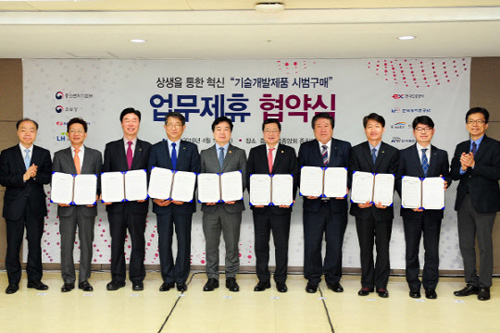Public organization to lead the middle innovative product purchase
Lee Joon Gee | bongchu@ | 2018-04-13 10:45:09

Hong Jong-hak, Minister of the Middle East (fourth left) and Park Chun-seop (fifth), are taking pictures with officials from six public agencies at the 'Agreement on Purchase of Technology Development Products' Mid-term delivery.
These concerns will disappear from public agency purchasing managers in the future. A system in which public institutions can actively purchase technology development products of startup companies that do not have delivery records or certification is implemented.
The Ministry of Small Business and Venture Business announced on April 12 that it will introduce `Technology Development Product Demonstration Purchase System` in order to open up new market for innovative start-up companies and to activate the purchase of technology development products of SMEs.
The Ministry of Finance and Economy (MOFE) concluded a business agreement with the Korea National Housing Corporation (KEMCO) on six business organizations including Korea Electric Power Corporation, Korea Land & Housing Corporation (LH) and Korea Highway Corporation.
The pilot purchase system is a method in which a committee determines whether or not a committee can purchase a commodity when an entrepreneur applies for the purchase of a new product for technological development, and the public institution purchases the commodity with the commodity. Six public institutions this year will purchase a total of KRW 43 billion in technology development products through this system. Korea Electric Power Corporation and Korea Land & Housing Corporation each have KRW 10 billion contracts, Korea Highway Corporation, Korea Rural Development Corporation and Korea Water Resources Corporation each have KRW 6 billion and KRW 5 billion.
Public institutions will be able to purchase trial purchasing products from August to September after notification of items to be purchased, application, reception, and product evaluation from this month. The Ministry of Finance and the Public Procurement Service are planning to increase the purchase amount with participating institutions in the next year by providing legal basis and incentive to participating public institutions. In addition, the company will improve its performance certification system so that technology development product development companies can obtain more supply opportunities in the public market and start-up companies can quickly enter the public procurement market.
In the meantime, public institutions prefer SME products with high performance or business performance due to audits or complaints, or there is a concentration of purchases by specific certifications.
As a result, public procurement of technology development products was sluggish and new companies had difficulty in entering the public purchasing market. Indeed, in 2016, SMEs accounted for only 4.3% of the purchase of technology development products in the public procurement market.
The Ministry of Finance and Economy expects that the purchase of technology development products by entrepreneurs will lead to an increase in the total purchasing items.
"We expect that the procurement environment that facilitates the innovation of SMEs will be built through the pilot purchase system," said Hong Jong-hak, the minister of the Ministry of Land, Transport and Maritime Affairs. "In the future, companies participating in pilot purchases will receive investment, We will have a comprehensive support system to grow into a company. "
Daejeon=By Lee Joon Gee bongchu@
